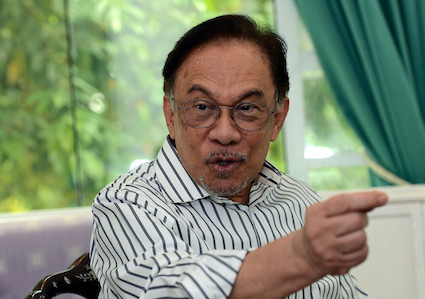For Anwar, Shafie’s Sabah setback still won’t guarantee him Malaysia’s top job, say analysts

(MMO) – On paper at least, Parti Warisan Sabah’s defeat in the September state polls was a boon to Datuk Seri Anwar Ibrahim’s position as the Opposition’s prime minister-designate.
Datuk Seri Shafie Afdal, Warisan’s president, would have been the strongest contender for the post if not for his dethronement as Sabah chief minister at the hands of a coalition of parties in the ruling federal government.
But analysts said the setback merely provides temporary respite, as Anwar’s path to becoming prime minister is still filled with obstacles both from within his own coalition and externally.
Inside Pakatan Harapan (PH), Anwar’s position as its chairman has not prevented his colleagues in DAP and Amanah from backing a proposal to name Shafie as the Opposition’s candidate for prime minister, a move that suggested a growing sense of wariness about having Anwar as the only option.
“Anwar is facing a challenge to justify his own bid to become prime minister, and by extension, having his candidacy backed by all Opposition parties,” said Shazwan Mustafa Kamal, senior associate at Vriens & Partners, a government regulatory affairs and political risk consultancy firm.
“Because there is fatigue surrounding Anwar as an option, and Opposition parties are turning to other figures like Shafie.”
Anwar, who was sacked as deputy prime minister and finance minister during the tumultuous final years of the first Mahathir administration, held an explosive press conference on September 23 where he claimed to have secured a “formidable” majority to form a new government.
The press conference, held just ahead of the Sabah state elections, was seen as an attempt to boost the odds for Warisan Plus — an alliance of Warisan, PKR and the United Progressive Kinabalu Organisation (Upko).
PKR only won two of the nine state seats it contested while Warisan secured an impressive 23 seats, the largest by a party.
Observers said the number of seats won by each party underpins the dynamics of political support for Anwar and Shafie.
While Anwar may be more popular in the peninsula, the number of seats that went to Warisan suggested it may be the opposite in Sabah, and perhaps by extension, Sarawak.
Conditional support
DAP and Amanah had said that their support for Anwar’s bid to become prime minister is conditional on his ability to muster support from both states.
Since the sensational announcement, Anwar has yet to reveal who or the exact number of MPs who have pledged to make that crossover, although his party colleagues in PKR argued that he may have valid reasons for doing so.
Still, analysts said this delay would only serve to sow doubts about his claims.
“Time is not on Anwar’s side. Since he made the announcement of having enough MPs (including from Umno) to back his bid as prime minister, there has been little follow-up to that with credible evidence,” Shazwan said.
“Should this drag on further, it may result in said MPs getting cold feet or having second thoughts about an alliance with Anwar.”
Speculation is rife that Anwar may have negotiated the support of MPs from rival party Umno, ostensibly in return for amnesty for those standing trial for corruption.
Umno’s central leadership has so far responded with mixed messages about the allegation.
Its president Datuk Seri Ahmad Zahid Hamidi issued a cryptic statement that suggested the crossover was a done deal. Others have denied this.
Oh Ei Sun, a senior fellow at the Singapore International Institute of Foreign Affairs, said until Anwar can produce credible evidence to back his claim before the Agong, it remains to be seen if the crossover from Umno will actually happen at all.
“That the key to Anwar’s success in flipping the federal government lies not so much on the intramural squabbling among the Harapan Plus side, as he solidly locked down his own PKR, DAP and Amanah,” according to Oh.
“The question is really if Umno, or at least its main faction headed by Zahid, is willing to flip to Anwar’s side, as their discontent with Bersatu in general and Prime Minister Tan Sri Muhyiddin Yassin in particular appears to be mounting.”
Wither away Shafie?
Analysts also said it would be a mistake to write Shafie off completely. Despite his party’s defeat, Shafie’s popularity received a tremendous boost after he led a campaign that ran on an inclusive platform.
At the same time, his refusal to court defections when his rivals in Gabungan Rakyat Sabah (GRS) — an alliance comprising Perikatan Nasional, Barisan Nasional, and Parti Bersatu Sabah — squabbled over the chief minister post may have resonated with many in PH, including DAP which contested the state elections under the Warisan banner.
“Anwar’s challenger at this point from the Opposition is Shafie Apdal. Even though the Warisan chief lost the Sabah election, it was a closely-fought battle,” said Shazwan.
“And some could argue Shafie’s decision to not resort to enticing GRS reps to defect amidst an impasse on GRS’ win on Sunday resonated with a lot of PH allies, especially DAP,” the analyst added.
“In Shafie, DAP sees a lifeline or a way to move beyond Anwar, and they have made it quite clear, judging from the public remarks senior party leaders have made on Anwar’s latest PM takeover bid.”
In the meantime, PKR remains tightlipped. Party leaders said it will only reveal the numbers either following an audience with the Agong, who requested for the meeting to be delayed because he had to seek medical treatment, or through a vote of confidence in Parliament.
The King, Sultan Abdullah of Pahang, has now been discharged from hospital, the Royal Palace said in a statement issued last week.
Component members PKR, DAP and Amanah hold a combined 91 seats in the Lower House, compared to Warisan’s eight seats and four from Parti Pejuang Tanah Air, the party led by Tun Dr Mahathir Mohamad.

